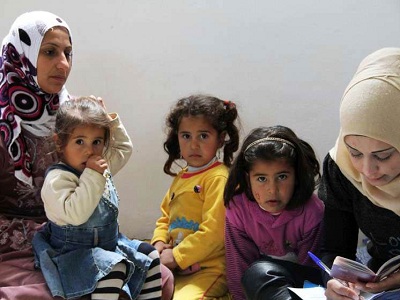
Palestinian pensioner Zahra Zahroura always imagined seeing out her days in her adopted Syrian hometown of Homs, sustained by the hope that being made a refugee once was enough for any lifetime.
But as the war in Syria worsened the 84-year-old was forced to flee a second time, aiming for a new life in mainland Europe but making it only as far as Cyprus, lucky to be alive at all.
“My husband worked and we lived well. But we had to leave because of the war,” says Zahroura, who was rescued on Sunday with more than 100 people aboard a small fishing boat that had drifted for three days under the scorching Mediterranean sun.
“All the houses were rubble, everything was destroyed by the bombing.”
Zahroura is one of a growing number of Palestinian refugees in Syria and Lebanon joining the hundreds of thousands of Syrians fleeing the war on the perilous journey to survival in Europe.
Her boat was carrying 115 refugees — including 54 women and children — which had set off from the Syrian port of Tartus before picking up more people in Lebanon’s Tripoli.
According to an official at Cyprus’ Kofinou camp, where those rescued are staying, most of the passengers aboard were Palestinians “from Lebanon or Syria”.
Palestinians, many of whom were driven or fled from their homes when Israel was founded in 1948, have experienced some of the worst horrors of Syria’s four-and-a-half-year civil war that has killed more than 240,000 people.
One of the largest Palestinian camps in Syria was Yarmouk, in Damascus, with a pre-war population of about 160,000. After years of fighting and siege, the UN’s Palestinian refugee agency UNRWA estimates there are just 18,000 people left alive there.
One of the Palestinians rescued off Cyprus is Mohammed Hussein Hassan, who flicks through pictures on his smartphone of his brother already safe in Berlin.
“I saw on television the thousands of migrants on the roads and that encouraged me to leave too,” he says.
Lebanon Overwhelmed
Coupled with a mass exodus of Syrians fleeing across the border, a major influx of Palestinians leaving Syria has overwhelmed tiny Lebanon.
Hundreds of thousands of Palestinians already eked out a living in one of Lebanon’s 12 unofficial refugee camps, and the UN now believes 450,000 Palestinians reside in the country — 10 percent of its population.
Although no longer under threat from aerial bombardment, Palestinians who have fled Syria to Lebanon say life in the camps is increasingly overcrowded and unbearable.
“We don’t have a country and Lebanon doesn’t give us any rights,” says Ghassan Nasser, a Palestinian from Beirut’s Shatila camp. “We lived under these conditions… but today we can no longer bear it.”
Unlike Hassan, Nasser says he was not driven to leave by footage of migrants packing roads and trains en route to northern Europe.
“We wanted to emigrate before the war in Syria,” he says.
Although “home” for Zahroura before the conflict was technically a refugee camp in Homs’s Baba Amro neighborhood, it was “a camp where you could live well, not like in Lebanon”.
She says she has no idea if she will be able to reach mainland Europe, joining the mass of humanity that has already fled Syria’s nightmare.
‘Arab Countries Have Failed’
EU member Cyprus lies just 100 kilometers (60 miles) off the Syrian coast but has so far avoided a mass influx of refugees from the conflict, with most preferring to bypass the island.
Although most of those of those rescued and brought to Cyprus hope to eventually reach northern Europe, some have begun proceedings to register as refugees on the island.
A similar boat to the one Zahrouha, Hassan and Nasser traveled on was rescued off the Cypriot coast late last year, with many Palestinians among the more than 300 on board.
Yehya al-Shabi, a Palestinian from Damascus aboard that boat, is clear that host countries must treat everyone fleeing conflict with equal compassion.
“There should be no difference in treatment between Syrians, Iraqis and Palestinians,” he says, displaying some of the sage advice that has earned him the nickname among fellow refugees of the “wise man of Kofinou”.
For Hassan, however, the onus also rests with Arab countries to ensure that Palestinians displaced by war are cared for.
“For Arab countries, we are the terrorists. If anything happens, they say it was the Palestinians’ fault. We don’t want their money, we just want to live in dignity,” he says.
“Arab countries have failed.”
(Ma’an and agencies)





